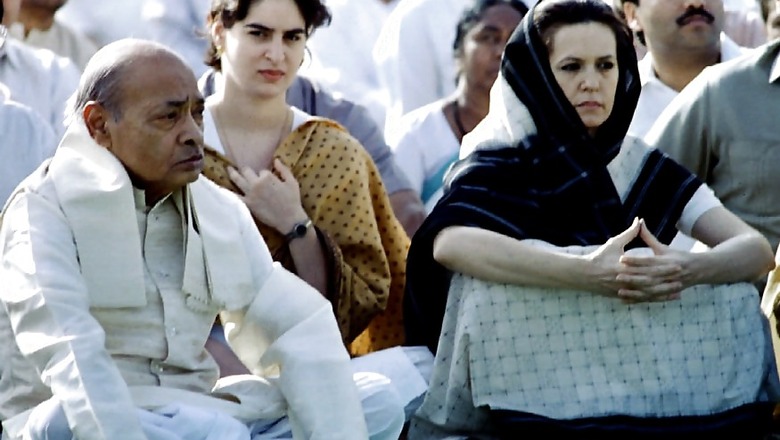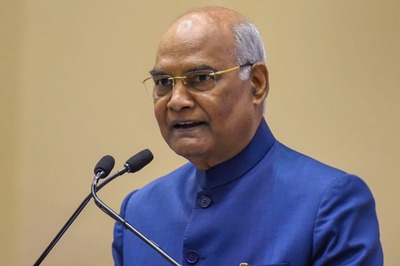
views
The BJP has appropriated P V Narasimha Rao, just as it did Sardar Patel and Netaji. Sixteen years after Rao's unsung death, the good that was interred with his bones is now being resurrected, to the chagrin of the Congress. It can only watch in guilty embarrassment as Prime Minister Narendra Modi valorizes Rao, for the same reasons that his own party discarded him.
The Congress First Family appears in a poor light vis-a-vis Rao, who suffered multiple humiliations at its hands, even unto death. His body was not allowed inside the Congress headquarters; nor was he given a state funeral or memorial in Delhi.
The BJP, on the other hand, had a soft spot for Rao, ever since he effectively dismantled Nehruvian socialism. At the historic Tirupati session in 1991, he sang Nehru's praises but over the next five years, steered the country in the opposite direction. By the time he demitted office, India had healthy forex reserves and was growing at 7.5 per cent.
The sangh parivar's fondness for Rao took firm root with the demolition of the Babri Masjid. Rao refused to impose President's Rule in Uttar Pradesh until the structure had actually fallen and by the next morning, a brick wall protecting the idol of Ram Lalla had come up. Rao later made a presidential reference to the Supreme Court in which he raised the issue of a 'temple' below the demolished structure, a fact which would bolster Hindu claims on the disputed site.
After Rao's death in 2004, the then RSS sarsanghchalak K S Sudershan would fondly recall amicable relations with him. A decade later, in 2015, the Modi government finally gave him a memorial at Ekta Sthal, Delhi's samadhi complex.
Sonia Gandhi's aversion to Rao was founded on personal grounds. For one thing, he was extremely close to Chandraswami, the controversial godman believed to have been involved in the assassination of Rajiv Gandhi. She monitored the probe closely and was unhappy with its progress. Like the media, she sensed a high-level conspiracy to derail the investigation — a fact of which the anti-Rao lobbies led by veterans like Arjun Singh and young Turks like Rajesh Pilot took full advantage.
Rao had been selected as PM for his unquestioning loyalty to the First Family, all too evident during the 1984 anti-Sikh riots in Delhi, during which he was a singularly ineffective Home minister. He was a compromise candidate, unambitious and ailing, expected to hold the fort until Sharad Pawar or Arjun Singh manouevered their way into the PM's chair. But after he took oath, the man of inaction became a man of destiny.
As PM, he introduced revolutionary reforms. As party president, he sought to change the Congress culture. He eliminated cliques, introduced checks and balances among the regional satraps and democratized organizational elections. His masterly manouevering kept the Opposition at bay. He doffed his hat to the First Family but didn't consult with Sonia or keep her informed.
Her disquiet was fed by Rao's political rivals, who accused him of giving short shrift to Nehruvian economics and maintaining an unhealthy proximity to the RSS/BJP. The party's brahmin-dalit-minority vote-base had eroded as a result, they said.
Sonia finally lashed out at Rao publicly in 1995. She appeared at a rally in Amethi with Priyanka at her side, vulnerable and dignified. As the bereaved widow, she expressed her pain that “four years and three months (after) my husband's death, the pace of investigations into his assassination is still so slow." As a leader-in-the-making, she warned that “divisive forces are gathering strength”.
From that moment on, Rao's days were numbered. After demitting office in May 1996, his legal troubles mounted. He was named as an accused in the St Kitt's forgery case and the Lakhubhai Pathak bribery case, along with Chandraswami. Eventually, he was acquitted in both, but his son was arrested in the Rs 133 crore urea scam.
The entire credit for economic reforms was given to Manmohan Singh, who became PM in 2004. Rao was not even given a place in the Congress Working Committee (CWC), as a former PM ought to have been. His contribution, in terms of pulling the country back from the brink and shaping its rise during the critical post-Cold War era, was forgotten. Sadly, even Manmohan Singh failed to acknowledge it. To all intents and purposes, Rao was a ghost.
For the BJP, Rao's status as the great reformer, the protector of Ram Lalla and victim of the Nehru-Gandhi dynasty is the perfect trifecta. The man whom the Congress regarded with contempt, the BJP accords the highest respect. The demand for a Bharat Ratna for Rao is being raised in several quarters. The award is within the PM's gift and nothing would irritate the Congress more.




















Comments
0 comment